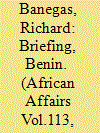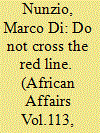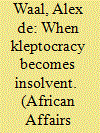|
|
|
Sort Order |
|
|
|
Items / Page
|
|
|
|
|
|
|
| Srl | Item |
| 1 |
ID:
133106


|
|
|
|
|
| Publication |
2014.
|
| Summary/Abstract |
The last two decades of economic decline in Africa have drawn attention to the crisis of masculinities, to "failed men" unable to build kinship networks and to "violent men" who damage social networks whilst competing for scarce resources. This article argues that a fragmented, neo-liberal society also produces new patterns of patriarchal aggrandisement. Focusing on Johannesburg's minibus-taxi industry, it shows how large informal sector activities are structured through kinship networks that in turn give rise to modes of masculinity seeking to control these networks. Johannesburg's minibus-taxi business is dominated by retrenched labour migrants, who moved into the transportation sector in the 1980s and 1990s at a time of industrial decline. It thus offers a case study of the changing patterns of accumulation and household formation in a social landscape where kinship ties continue to constitute the key relationships of obligation and support. Drawing on three-dozen core interviews with Zulu-speaking taxi owners and transporters, this article demonstrates that the taxi owner and the taxi boss are men to be emulated, but that the relationships between "big men" and "failed" or "violent" men are uncomfortably close.
|
|
|
|
|
|
|
|
|
|
|
|
|
|
|
|
| 2 |
ID:
133107


|
|
|
|
|
| Publication |
2014.
|
| Summary/Abstract |
Since 2012, political tension has threatened to undermine Benin's image as a model democracy. The President's efforts to amend the constitution to enable him to contest a third consecutive term, alongside the persecution of some of his former allies, have created a climate of political uncertainty. As a result, a wave of civic protest has gained momentum, a general strike launched in January 2014 lasted for more than four months, and the Catholic Church has broken its silence and denounced the excesses of those in power for the first time since the National Conference in 1990. This Briefing argues that these developments can be considered, on the one hand, as an extension of Benin's passive democratic revolution, a process whereby the co-option of actors from different generations and social strata - the expansion of the "politics of the belly"1 - facilitated the transition from one-party to multi-party rule. On the other hand, the highly volatile situation of the last two years could be said to mark a shift towards a more confrontational scenario of hegemonic rupture in which past agreements on how to share power are torn up by a President determined to capture all economic and political opportunities for himself.
|
|
|
|
|
|
|
|
|
|
|
|
|
|
|
|
| 3 |
ID:
133105


|
|
|
|
|
| Publication |
2014.
|
| Summary/Abstract |
Only five years after it lost a national election in Addis Ababa, the overwhelming victory of the Ethiopian People's Revolutionary Democratic Front (EPRDF) in the 2010 general elections marked the defeat of the opposition parties and the return to a dominant-party state. The capacity of the EPRDF to mobilize people in towns and the capital city triggered debates on the nature of consent in urban Ethiopia. This article contributes to this debate in two ways. First, it maps the specific institutions and strategies the ruling party has used to close political space in the capital since 2005, explaining how it has tied political mobilization to the delivery of services to those at the bottom of urban society. Second, it examines interactions between the ruling party and young people involved in government development programmes and youth organizations, demonstrating the subtle ways dissent is expressed even as EPRDF power is reproduced. In this regard, the victory of the ruling party in 2010 does not bear witness to the neutralization of dissent. Rather, it reveals a reshaping of the way the government has governed and controlled the city since the late 1990s.
|
|
|
|
|
|
|
|
|
|
|
|
|
|
|
|
| 4 |
ID:
133104


|
|
|
|
|
| Publication |
2014.
|
| Summary/Abstract |
Government demolitions have displaced hundreds of thousands of people in Abuja, Nigeria's Federal Capital Territory, over the last decade. This housing insecurity is not simply the result of urbanization, population growth, or wealth disparities. We attribute it instead to a property rights regime that perpetuates discrimination by providing special land rights for the area's early inhabitants. Laws accenting differences between "strangers" and indigenes, and migrants' social coping mechanisms that reinforce ethnic identities, should exacerbate the conditions for conflict. However, as indigenes have been short-changed by policies to relocate and compensate them, their interests have aligned more closely with migrants seeking improved housing security. Strategies to achieve this have shifted from judicial appeals and confrontational protests to government engagement. By pursuing the shared goal of housing rights for migrants and indigenes alike, new multi-ethnic coalitions have helped defuse tensions over land that have proved to be conducive to conflict elsewhere in Nigeria.
|
|
|
|
|
|
|
|
|
|
|
|
|
|
|
|
| 5 |
ID:
133103


|
|
|
|
|
| Publication |
2014.
|
| Summary/Abstract |
The expansion of Chinese activities in Africa has been accompanied by a growing number of young Chinese women migrants engaged in prostitution, transforming the red-light districts of some African cities from markets almost entirely monopolized by local sex workers into highly competitive Chinese commercial sexualized sites. In Cameroon, disgruntled local sex workers now point to a 'Chinese sexual invasion' and blame young Chinese women for the decline in their business. This article explores some of the remarkable tactics devised by local sex workers in Douala to deal with the 'unfair competition' represented by Chinese sex workers. These tactics include the production of extremist discourses that construe Chinese sex workers as economic predators, and characterize them as dangerous putes sorcières (bitch-witches). The article concludes that the pervasive idiom of occultism, embodied by the concepts of "magic body" and "cursed sex" that permeate much of the popular imagination of Chinese sex labourers in Cameroon, reflects a broader disenchantment with recent China-Africa cooperation, which is increasingly perceived as an attempt by China to control Africa's immense natural resources under the guise of mutually beneficial relations.
|
|
|
|
|
|
|
|
|
|
|
|
|
|
|
|
| 6 |
ID:
133102


|
|
|
|
|
| Publication |
2014.
|
| Summary/Abstract |
South Sudan obtained independence in July 2011 as a kleptocracy - a militarized, corrupt neo-patrimonial system of governance. By the time of independence, the South Sudanese "political marketplace" was so expensive that the country's comparatively copious revenue was consumed by the military-political patronage system, with almost nothing left for public services, development or institution building. The efforts of national technocrats and foreign donors produced bubbles of institutional integrity but the system as a whole was entirely resistant to reform. The January 2012 shutdown of oil production bankrupted the system. Even an experienced and talented political business manager would have struggled, and President Salva Kiir did not display the required skills. No sooner had shots been fired than the compact holding the SPLA together fell apart and civil war ensued. Drawing upon long-term observation of elite politics in South Sudan, this article explains both the roots of kleptocratic government and its dire consequences.
|
|
|
|
|
|
|
|
|
|
|
|
|
|
|
|
|
|
|
|
|